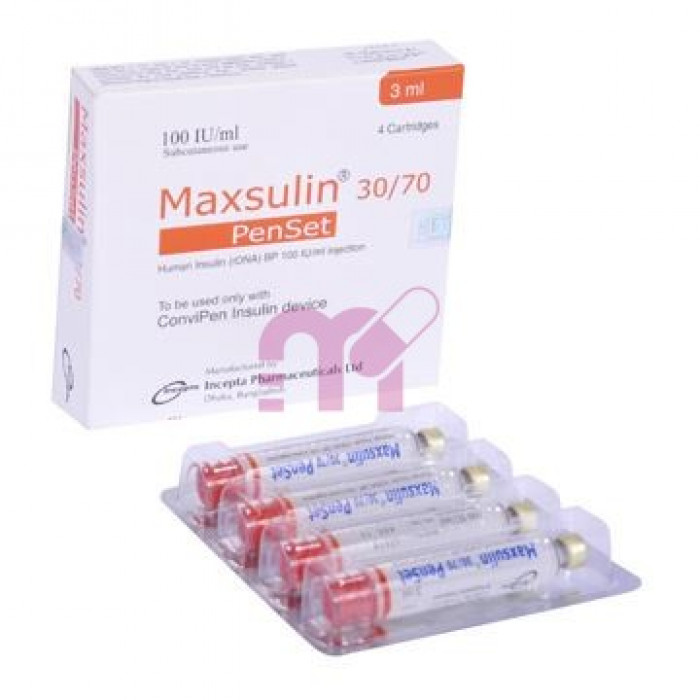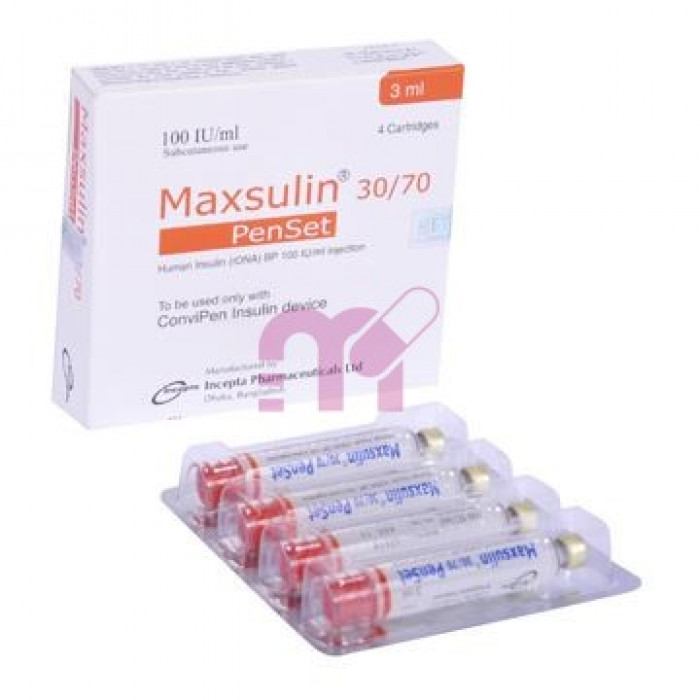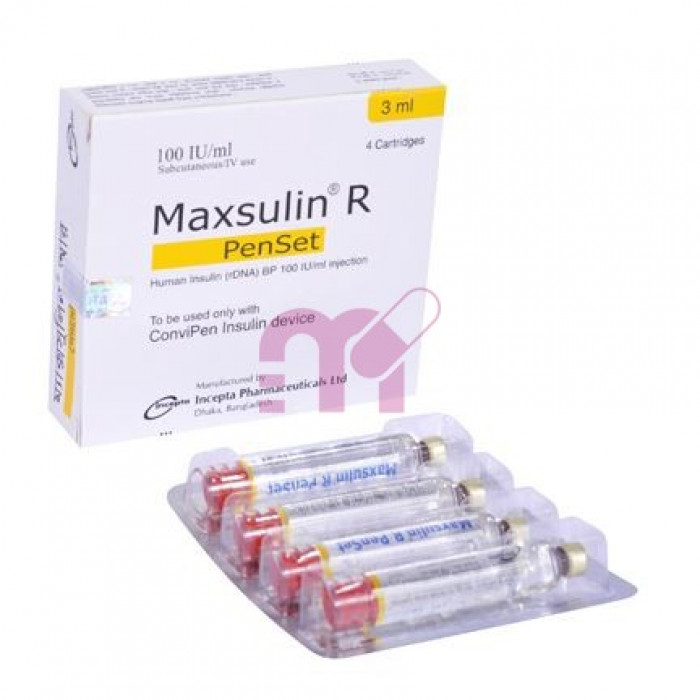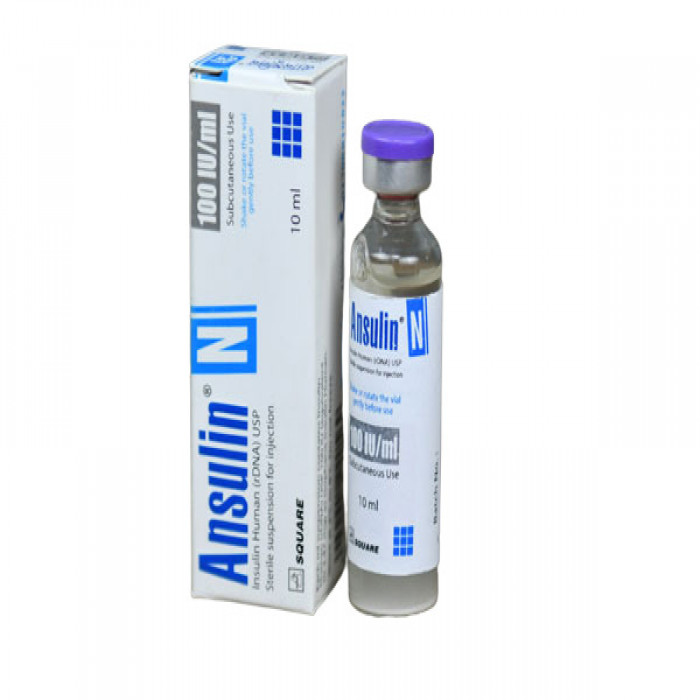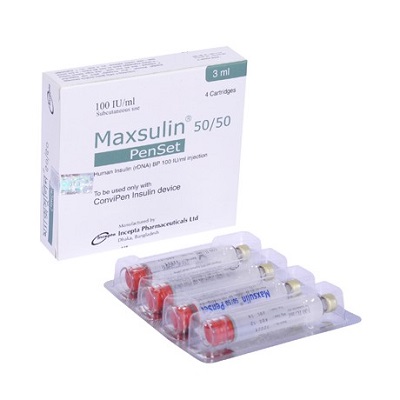
✔ 100% Authentic Product
👁️ Currently Viewing 2810
Maxsulin 50/50 penset 100IU/3ml 1Pc
Insulin, Generic Name: Human (rDNA) + Isophane Insulin Human 50%+50% in 100 IU/ml, Manufacturer: Incepta Pharmaceuticals Limited
🚚 তাপমাত্রা নিয়ন্ত্রিত ডেলিভারি: এই পণ্যটি গুণগত মান বজায় রাখতে শুধু মাত্র ঢাকা শহরের ভিতরে আইস ব্যাগ এর মাধ্যমে ডেলিভারি করা হয়।
Discount
Price: ৳ 214
MRP:
৳
225
5%
Off

100% Genuine Products, Guaranteed

Safe & Secure Payments, Always

Fast, Secure & Efficient Delivery

Proper Packaging
 Cash on Delivery - All over Bangladesh
Cash on Delivery - All over Bangladesh Regular Delivery - 12-24 Hours, Dhaka City* Charge Tk.39-59
Regular Delivery - 12-24 Hours, Dhaka City* Charge Tk.39-59 Regular Delivery - 24-48 Hours, Other Cities* Charge Tk.99-110
Regular Delivery - 24-48 Hours, Other Cities* Charge Tk.99-110
 ফ্রি ডেলিভারিঃ - ৯৯৯ টাকা+ অর্ডারে, ঢাকা
শহরে
ফ্রি ডেলিভারিঃ - ৯৯৯ টাকা+ অর্ডারে, ঢাকা
শহরে ফ্রি ডেলিভারিঃ - ২৯৯৯ টাকা+ অর্ডারে, ঢাকার
বাহিরে
ফ্রি ডেলিভারিঃ - ২৯৯৯ টাকা+ অর্ডারে, ঢাকার
বাহিরে
100% Genuine Products, Guaranteed
Safe & Secure Payments, Always
Fast, Secure & Efficient Delivery
Proper Packaging
 Cash on Delivery - All over Bangladesh
Cash on Delivery - All over Bangladesh Regular Delivery - 12-24 Hours, Dhaka City* Charge Tk.39-59
Regular Delivery - 12-24 Hours, Dhaka City* Charge Tk.39-59 Regular Delivery - 24-48 Hours, Other Cities* Charge Tk.99-110
Regular Delivery - 24-48 Hours, Other Cities* Charge Tk.99-110 ফ্রি ডেলিভারিঃ - ৯৯৯ টাকা+ অর্ডারে, ঢাকা
শহরে
ফ্রি ডেলিভারিঃ - ৯৯৯ টাকা+ অর্ডারে, ঢাকা
শহরে ফ্রি ডেলিভারিঃ - ২৯৯৯ টাকা+ অর্ডারে, ঢাকার
বাহিরে
ফ্রি ডেলিভারিঃ - ২৯৯৯ টাকা+ অর্ডারে, ঢাকার
বাহিরে
✅ Description:
Indications
All patients with type 1 diabetes are treated. Treatment of patients with type 2 diabetes who are unable to regulate their blood sugar levels with diet and/or oral hypoglycemic medications.
In diabetic patients with diabetic ketoacidosis, hyperosmolar non-ketotic syndrome, and during periods of stress such as severe illnesses or major surgery, for the first stabilization of diabetes. Preventing and treating gestational diabetes.
Pharmacology
Insulin Human (rDNA) is a recombinant DNA-produced human insulin. Its structure and function are identical to that of natural insulin. Insulin is a hormone that regulates glucose metabolism and increases glucose absorption and utilization by the liver, muscle, and adipose tissue. It also decreases blood glucose levels by speeding up glycogenesis and slowing down gluconeogenesis.
30/70 Insulin Human (rDNA) & 50/50 Insulin Human (rDNA) Within 30 minutes of injection, the drug begins to work, reaches peak levels in 2-8 hours, and lasts for around 24 hours.
Dosage & Administration
The average range of total daily insulin requirement for maintenance therapy in type 1 diabetic patients lies between 0.5 and 1.0 IU/kg. In pre-pubertal children it usually varies from 0.7 to 1.0 IU/kg, whereas in insulin resistant cases, e.g. during puberty or due to obesity, the daily insulin requirement may be substantially higher. Initial dosages for type 2 diabetic patients are often lower, e.g. 0.3 to 0.6 IU/kg/day.
The dosage form, the dosage and the administration time of the insulin are different due to the individual differences of each patient. In addition, the dosage is also affected by food, working style and exercising intensity. Therefore, patients should use the insulin under doctor's instruction.
Interaction
When taking oral contraceptives, adrenal cortical hormone, thyroid hormone, and other medicines that cause blood glucose to rise, you may need to raise your Insulin dosage. When utilizing hypoglycemic medicines such as salicylate, sulfanilamide, and other anti-depressants that cause a drop in blood glucose, the insulin dosage should be lowered.
Contraindications
Patients with hypoglycemia or who are allergic to insulin or any of the excipients.
Side Effects
Hypoglycemia is the most prevalent side effect of insulin therapy, and symptoms of hypoglycemia can strike without warning. There have been a few reports of adverse reactions such as redness, swelling, and itching. It normally vanishes after a few days. In other cases, other factors, such as disinfectant or poor injection technique, may be to blame for the allergy rather than insulin.
Pregnancy & Lactation
Insulin treatment for diabetes is not restricted during pregnancy since insulin does not cross the placental barrier. The infant is not at risk from the mother's insulin medication.
Precautions & Warnings
Hyperglycemia can result from insufficient dose or withdrawal, especially in those with type 1 diabetes. If the insulin dose is excessively high in comparison to the insulin need, hypoglycemia might result. Hypoglycemia can be caused by skipping a meal or engaging in unplanned, severe physical activity.
Therapeutic Class
Medium Acting Insulin
Storage Conditions
Refrigerate between 2°C and 8°C. Do not allow yourself to become frozen. If you don't need to refrigerate insulin for immediate use, keep it in a cold place away from heat and light. Insulin can be stored at room temperature for up to a month.
⚠️Disclaimer:
At ePharma, we’re committed to providing accurate and accessible health information. However, all content is intended for informational purposes only and should not replace medical advice from a qualified physician. Please consult your healthcare provider for personalized guidance. We aim to support, not substitute, the doctor-patient relationship.




